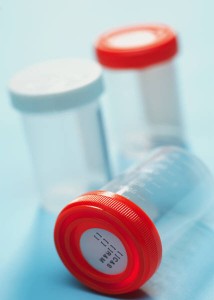 In patients at high risk for developing another stone, a metabolic evaluation is usually recommended. This includes analysis of the stone, blood tests, and a 24-hour urine collection. The urine collection involves saving urine for 24 hour period and taking the collection or sending a small sample of the collection to a laboratory. Tests will be performed to determine if there are any abnormalities in a stone patient’s metabolism that puts them at higher risk for forming more stones. The results of these tests will then be discussed with a patient to choose a treatment plan individualized to their unique situation.
In patients at high risk for developing another stone, a metabolic evaluation is usually recommended. This includes analysis of the stone, blood tests, and a 24-hour urine collection. The urine collection involves saving urine for 24 hour period and taking the collection or sending a small sample of the collection to a laboratory. Tests will be performed to determine if there are any abnormalities in a stone patient’s metabolism that puts them at higher risk for forming more stones. The results of these tests will then be discussed with a patient to choose a treatment plan individualized to their unique situation.
Specific medical conditions that predispose to stones
In a minority of stone patients, an identifiable medical condition can be the cause of stones. These uncommon conditions include primary hyperparathyroidism, renal tubular acidosis, cystinuria, hyperoxaluria, and gouty diathesis. In these situations, specific treatments can help prevent or reduce future stone development.
Other abnormalities in metabolism that predispose to stones
In the majority of stone patients, more subtle abnormalities may be present that increase their risk for developing stones. Identifying these abnormalities can help direct specific dietary or pharmaceutical treatments to lower the chances of another stone from forming. These abnormalities can occur together and include:
- Low urine volume
- Hypercalciuria (high calcium concentrations in urine)
- Hyperoxalauria (high oxalate concentrations in urine)
- Hypocitraturia (low citrate levels in urine)
- Hyperuricosuria (high uric acid levels in urine)
Additionally, there are other factors that can put someone at increased risk for forming stones including gender, race, age, geography, climate, body weight, occupation, the presence of urinary infections, and anatomic abnormalities.
Stone analysis is an important part in the evaluation of patients having stone disease. What methods are used in US to evaluate kidney stone composition?
Extracorporeal wave lithotripsy uses sound waves to interrupt up massive stones so that they will additional simply pass down the ureters into your bladder. This procedure will be uncomfortable and should need lightweight anaesthesia. It will cause bruising on the abdomen and back and haemorrhage round the urinary organ and close organs.
I have been suffering with Kidney Stone for the past over 20 years.Twice I got lithotripsy done for the removal of stone which was successful but again after 4-5 years it recurs.Though I am taking plenty of water but stone formation is not stopped.
What dietary changes I should make or what medication I should take for the removal of K.S. which is app.6.50 mm in size.
Does it affects kidney functioning also ?
I understand some Homoe medicines are available in the market for the treatment of K.S.,please suggest.
I am suffering from midney stones and uti s for years At the start a cyst was drained in my left kidney Had several stents in left kidney Last year got stone in right kidney while stent was in left kidney bad two more all in three months Two this one i passed last month at home Had three u t is since Have same symtoms now Any cure Jo
I just complete my treatment some days back…. it’s really bad! still on doctors observation
hi friends I m 33yrs old. I m suffering from recurring kidney stones for more than 15yrs.